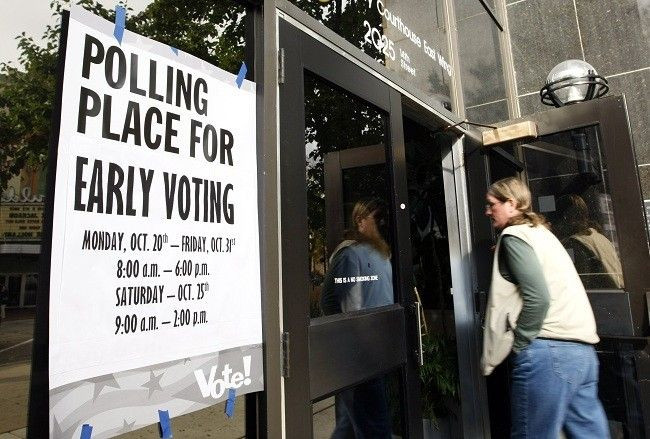Red States Move to Change Voting Laws Ahead of 2012 Election: Are They Doing it to Hurt Democrats?
ANALYSIS

The right to vote, one of the most defining rights of our democracy, is under attack.
With their eyes set keenly on the upcoming 2012 presidential elections, several Republican-led states have either passed or initiated legislation this year that severely hampers certain citizens' ability to vote, a move that some critics have said is a blatant example of voter suppression.
In May, the Florida legislature passed a bill that severely tightens rules of third-party voter registration groups and limits the number of days early voting can take place. Wisconsin soon followed with Assembly Bill 7, which also requires that all voters present government-issued photo identification at the polls, a move that has been adopted by five other states and is also being considered by major swing-state Pennsylvania.
Are Election Law Changes Discouraging Adults From Voting?
Although many state governments have claimed these laws have been implemented as a way to curb voter fraud and insure a more orderly voting process, Democrats see it as way for Republicans to make it more difficult for voters to cast their ballot.
In particular, the new rules may make it more difficult for or even discourage minorities, seniors and youth voters from making it to the polls, demographics that came out in full force during the 2008 election to vote for Barack Obama. More than 130 million voters turned out to vote in 2008, the most ever to cast a ballot in a presidential election.
While the changes may not seem detrimental to many, they may actually disenfranchise thousands of voters. In May, Deirdre Macnab, the president of the Florida League of Women Voters, told The New York Times that Florida's rule about third-party registration groups -- which requires them to submit voter registration forms to the state within 48 hours or risk fines -- will likely keep her organization from registering voters because she cannot ask volunteers to assume that risk.
Heather Smith, the president of Rock the Vote, a group that focuses on registering young voters, told The Washington Post that her organization may file a lawsuit in Florida in an attempt to get some of those rules overturned. The group plans to announce a new initiative this fall called You Can't Stop Us, in reaction to the new election laws.
Both the Florida and Wisconsin laws also make it difficult for people who move county to county to vote. While registered voters could previously change their addresses at a polling station, individuals in those states must now make those changes in advance; in Wisconsin, people who have moved within 28 days of an election will be unable to vote in their new district.
Requiring a Photo: Does It Discourage Voting?
In an Op-Ed published in The Capital Times, Wisconsin State Sen. Mark Miller refers to his state's revisions as the Voter Suppression Act.
While a move such as requiring photo identification does not seem like it would hurt most registered voters, Miller wrote that 20 percent of Wisconsin residents currently do not meet the photo identification requirements specified in the law, including 178,000 seniors.
Moreover, according to a study by the Brenna Center for Justice at New York University Law, 25 percent of African-American voters do not have a valid government-issued ID. About 15 percent of voters earning less than $35,000 a year reportedly do not have such an ID, either.
At the beginning of the year, only Georgia and Indiana required voters to present photo identification at the polls. In addition to Wisconsin, Kansas, South Carolina, Tennessee and Texas have since adopted such rules.
While Republicans continue to insist the election laws popping up in their states have nothing to do with a partisan agenda and everything to do with preventing voter fraud, it's obvious that is not the case. Even in Florida, the scene of the embarrassing voting debacle that changed the fate of the 2000 presidential election, the Department of State has only reported 31 cases of alleged voter fraud in the past three years.
Instead of turning back the clock and imposing new requirements that make it more time-consuming, confusing and significantly less convenient to vote, maybe the GOP should focus on revamping its own policy and running reasonable candidates who they actually believe can stand a chance in 2012. Then, maybe they could focus on the political, social and economic issues that actually matter instead of passing laws that hinder the constitutional rights of their own constituents.
© Copyright IBTimes 2025. All rights reserved.





















